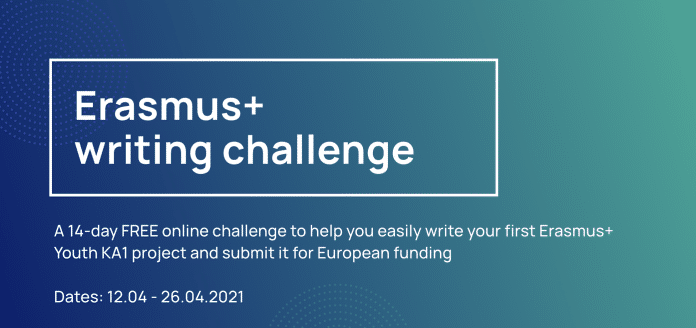As the Erasmus+ Programme 2021-2027 has gone public late in March, it is now time to submit your projects for approving. Being you either a beginner, wanting to enter the world of European projects, or a project manager already been dealing with the Erasmus+ projects for a long time now, there is a challenge on writing Erasmus+ projects to practice your skills.
Erasmus+ Writing Challenge
The Erasmus+ Writing Challenge is a 14-day FREE online challenge to help you easily write your first Erasmus+ Youth KA1 project and submit it for European funding.
It runs on the following dates: from April 12th to April 26th 2021. The hosting organiser is Youth Academy.
Features of the Challenge
The challenge goes with the support of:
- Daily Videos: based on years of personal experience in grant writing and European funding, Youth Academy splits the project writing process into 14 steps. They will post a short daily explanation video in Erasmus+ Youth Academy FB community at 19.00 CET from 12th to 26th of April.
- Home Tasks: every day, after each video, you will receive a small home task. You will need around 30 minutes to complete it, and at the end of the challenge you’ll have a fully developed project idea ready to be submitted for May 11th deadline.
- Useful links and materials: a daily email sent to all registered participants will contain a reminder, useful links and materials. In this case not only you won’t miss a video, but also will receive extra support to help you complete a daily project writing task.
- Supportive Community: you don’t need to do it alone. In Erasmus+ Youth Academy you’ll complete the challenge day-by-day with other participants (or your own team), as well as share your successes and ask questions to challenge facilitators.
Participants
The writing challenge targets specifically:
- Youth Leaders (who already participated in Youth Exchanges or training courses before, and want to organise their own project but don’t know where to start);
- NGO Leaders (who are looking at the European grants to scale their activities and increase impact, and would like their employees/volunteers to learn the grant writing process);
- Project Managers (who successfully managed local or international projects but never/unsuccessfully applied with their personal ideas in the past and now want to learn it the right way);
- Future Grant Writers (who like shaping meaningful ideas into projects and want to learn it professionally to become an in-demand grant writer and support NGOs all over Europe).
Schedule
| Day 0 / Motivation and preparation: Why do you want to carry out a KA1 mobility? Organization registration and OID. Drafting PIF both for your project and future partners. | Day 1 / Intro to Erasmus+ Youth KA1: Principles and priorities of Erasmus+ (2021-2027). Project formats. Difference between youth exchanges and professional development activities. Tips on how to read the Guide. |
| Day 2 / Finding the problem: How to find the problem and check its relevance to Erasmus+. Reasoning your choice in the application form. Statistics and European Strategy. | Day 3 / Needs’ analysis: Define the target audience of your project – future participants. What are their needs, fears and desires? Ways to conduct needs’ analysis. |
| Day 4 / Project concept development: Project development tool – Circle of creativity. Making reality check and defining vision, goal (6W) and objectives of your project. Relation to Erasmus+ and European Strategy. | Day 5 / Participants’ profile: What’s the profile of your participants? (their background, age, life experiences, needs and issues, do they face fewer opportunities) How will they be included into the project? Participation ladder of Roger Hart. |
| Day 6 / Team and partners: Who is in your team and what are their strong sides? How to search for partners? First email and basic project info. Partners’ agreements based on the project lifecycle and means of communication. | Day 7 / Practical arrangements: Logistics & practicalities: whose responsibility is this? Timeline of project preparation, implementation and follow-up. Common mistakes. |
| Day 8 / Preparation of participants and learning outcomes: Different types of preparation. Special preparation of participants with fewer opportunities. Introduction into Youthpass and key competencies. | Day 9 / Activity program: Intro into informal and non-formal learning methods. How to develop a well-balanced program? Tips&Tricks on designing activity program. |
| Day 10 / Project outcomes and their dissemination: Tangible and intangible results. Examples of good dissemination strategies. Dissemination of the outcomes and project visibility tips. | Day 11 / Expected impact: Impact on direct and indirect beneficiaries, as well as local, national and European levels. Ways to measure impact. Checking coherence with Erasmus+ KA1 expected impact. |
| Day 12 / Project monitoring and evaluation: Risk assessment: what can go wrong in the project and ways to predict and prevent risks. Developing a project monitoring plan. Designing criteria of project success. | Day 13 / Final project check-up: How to quickly check project coherence and clarity. Common mistakes. Checklist based on project assessment criteria. |
| Day 14 / Application form: How to fill in the electronic form: sections and questions. Budget and annexes. Checking all formal criteria and documents before submission. |
The challenge goes under the supervision of the following facilitators:
Anna Korjakina, Grantwriter of projects for NGOs in Europe and the CIS, NFE trainer and mentor.
Yulia Markos, Strategic leader at Synergy Bulgaria, project coordinator, coach and mentor.
Registration and contacts
For any question you may have, please contact the organiser to the following email: [email protected].
To register, fill out this form.
Read also




